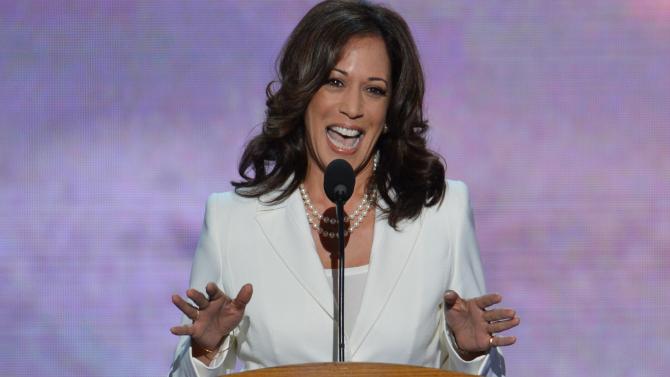
You might be dreading 2016 because it will be the last year of the first black president.
But all is not lost, fam. Chances are you’ll get your first African-American female senator in over 15 years.
With Sen. Barbara Boxer (D-Calif.) retiring, history is about to make another run. The Golden State’s attorney general, Kamala Harris, a Democrat, is announcing her bid for the seat. Going in quick and early, less than a full week after Boxer’s retirement news, signals shrewd mastery of the political calendar. That potentially clears a crowded field. Potential rival Northern California golden boy Lt. Gov. Gavin Newsom already pulled his name from contention and instead put first dibs on the governor’s mansion for 2018.
It’s been a long time coming. We’ve pulled in several brothers, for better or for worse, to serve as U.S. senators, and one even made it to the White House. But we’ve had only one African-American woman in the Senate: Sen. Carol Moseley-Braun (D-Ill.), a once-promising Chicago pol whose career ended on a flat, fourth-place run for Windy City mayor.
Don’t let the palm trees and idyllic Pacific surf fool you, though. West Coast politics is a dirty business in the nation’s largest state. Still, when the dust settles and it’s all said and done here are five reasons Kamala Harris could be a U.S. senator:
She’s won statewide, already—twice. And she can do it again. Harris already has a reliable campaign infrastructure in place to simply plug into the Senate race. With Newsom out, she can also tap into his network of campaign flacks, fundraisers and other consultants who’ll be looking for work.
But as a black female candidate running statewide, Harris has proven herself a political force of nature. She won all 2010 and 2014 primaries and general elections for attorney general, meaning—technically— she’s run four times throughout the state. In 2010, she won 33 percent of the vote out of a packed seven-candidate Democratic primary, then beat the Republican opponent in the general by 1 point with 46 percent. By 2014, she was soundly beating the competition with more than 53 percent of the vote in a blanket multiparty primary and a very solid 57.5 percent in the general.
President Barack Obama’s got an interest in the race. It’s no secret that Harris is an Obama favorite—he even weathered public shade for calling her “the best looking attorney general” back in 2013. But the president has long had a close political relationship with Harris as one of his superstar protégés. He put resources behind her 2010 and 2014 runs and it’s expected he’ll do it again in 2016. Hence, a Harris win will not only make history, but it will reflect just how much political clout the president has in his final two years.
She’ll raise lots of money. We’re expecting a $100 million-plus race. Conventional wisdom might give liberal hedge fund billionaire Tom Steyer—who also announced a bid for Boxer’s seat—the edge simply because he’s got bottomless loot packs: He spent $74 million of his own money to push climate change in 2014. But, Californians don’t respond particularly well to mega rich retirees running for office. Just ask eBay founder Meg Whitman who ran as a Republican in the 2010 California gubernatorial race. She spent $140 million of her own money, but ended up with less than 41 percent of the vote against the Democrat, and much poorer, Jerry Brown.
Harris kicks off with $3 million in the campaign bank. She’ll most certainly tap into President Obama’s vast and limitless fundraising network, including Hollywood entertainers and uber-wealthy Silicon Valley tech heads who know her by first name. She may even get a boost from the Indian diaspora since she’s half-Indian.
Boxer wants a woman—and the dudes have issues. Observers note that Boxer and a number of powerful women’s groups, such as EMILY’s List, quietly prefer a woman replacement—not a hedge fund manager and probably not former Los Angeles Mayor Antonio Villaraigosa, even though the latter could make history as California’s first Latino senator.
She’ll have black votes locked. Don’t count out rather influential blocs of California’s minority voters. While the state’s voters are disproportionately white, 11 percent are Asian (with Harris expected to get a nice cut of that) and 6 percent are African American. The question mark is Latino voters who represent 17 percent of the state’s vote. Harris should get the black vote hands down, especially if the state’s powerful black political class stands behind her, including senior black female members of Congress from Northern Cali such as Rep. Karen Bass (D-Calif.) and Rep. Barbara Lee (D-Calif.). It’ll be unclear what powerful House Financial Services Committee ranking member Rep. Maxine Waters (D-Calif.) might do. Will she have to side with Villaraigosa, whom she previously endorsed for mayor?
Charles D. Ellison is a veteran political strategist and regular contributor to The Root. He is also Washington correspondent for the Philadelphia Tribune and chief political correspondent for Uptown magazine. Follow him on Twitter.















